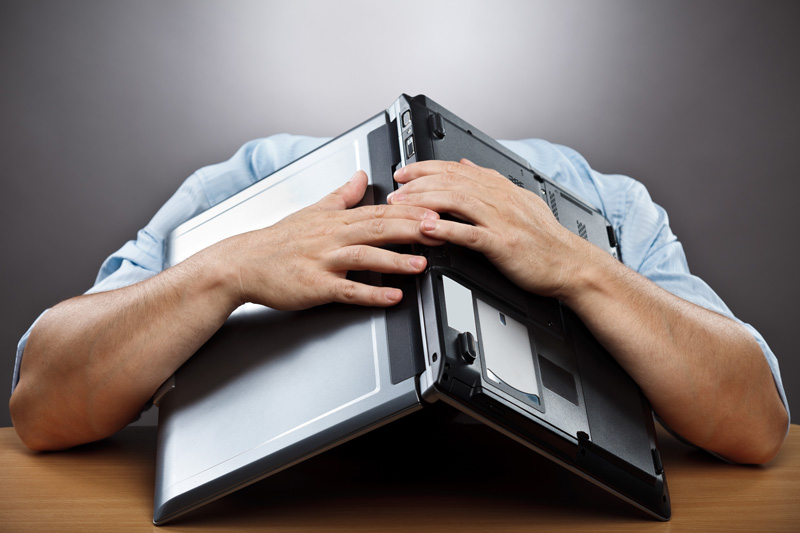
Another Reason to Log Off
How much time a week do you spend on social media? Have you ever noticed that your mood can sometimes be affected by your social media interactions? If so, you’re not alone. A recent study found that the percentage of U.S. teens and young adults who experience depression and suicidal thoughts has risen shockingly over the past decade: by 52 percent in teens and 63 percent in young adults. And rates of psychological distress among this age group have also risen by 71 percent. Perhaps worst of all, the suicide rate among 18- to 19-year-olds rose by 56 percent. And scientists think social media and smartphones may be at least partially to blame.

Here’s how the researchers involved in the study explain it. In the past decade, while rates of teen depression and suicide have skyrocketed, social media and smartphone use among this age group was also drastically on the rise. That might be just a coincidence, but it actually turns out that the more time you spend engaged in social media, the greater the risk that you will experience these negative psychological symptoms. This is because people need in-person social interactions for their emotional health. Social media may also inhibit you from enjoying the fun activities in your life: rather than being “in the moment,” you might be more focused on taking the right photo to post online. In this way, many teens and young adults become more concerned with what other people think about their lives–and how they will be judged by their peers–than they are with actually enjoying themselves. While adults experience many of the same negative effects from social media, teens and young adults are more dramatically affected because in general, they care more about the judgments of their peers than most adults do.
Scientists stress that the rise in teen depression is complicated, and no single issue is to blame. Still, it’s probably worthwhile to take a look at your own social media use and be aware of any effect it may be having on your psychological health.
Note: If you or anyone you know is experiencing signs of depression, suicidal thoughts, or other psychological distress, please contact the National Suicide Prevention Lifeline at 1-800-273-8255, which is available 24 hours a day.
Dig Deeper See if you can avoid checking in with social media for 24 hours straight. What feelings do you notice yourself experiencing? Do you feel anxious, like you are missing out on something? How often do you notice yourself reaching for your phone to check in? Write a paragraph describing the experience of cutting yourself off from social media, whether or not you were successful, and whether or not you will try to limit your social media time from here on out.
O’Rourke 2020?
You might remember the name Beto O’Rourke. He’s the Democrat who took on Texas Senator Ted Cruz in last year’s midterm elections–and very nearly won, despite the fact that Texas traditionally is a Republican stronghold and Ted Cruz is a household name. Last week, he announced his plans to run for president in 2020.
O’Rourke, 46, is a former three-term state representative who gained a nationwide grassroots following during the midterms because of his enthusiasm and his boots-on-the-ground, nontraditional style of campaigning. For example, he refused to accept corporate donations, wouldn’t go negative against Cruz, and personally traveled to all 254 Texas counties, even the most deeply Republican ones.
But will this unorthodox style and grassroots support be enough to make O’Rourke a contender for the highest office in the land, in a field that is already crowded with strong candidates? Political experts disagree. Some are concerned that he doesn’t have the necessary experience or political wins to become the next Democratic candidate. Others, however, point to his energy, youth, and widespread appeal as huge advantages. He also has a history of taking on Trump, most recently protesting Trump’s southern border wall. Progressive Democrats support him, and his history of bipartisanship means that he may be able to woo more centrist members of the party as well.
Dig Deeper Look up O’Rourke’s three-minute presidential campaign announcement video online. What unusual aspects of his campaigning style do you notice? Would this make you more or less likely to support O’Rourke as the Democratic candidate? Explain.
Saudi Women’s Activist Appears in Court
Imagine being arrested for driving a car just because you’re a woman. Until last May, this could have been the case if you lived in Saudi Arabia, where it was once illegal for a woman to drive. In 2014, a 28-year-old Saudi women’s rights activist named Loujain al-Hathloul took a video of herself driving from the United Arab Emirates to Saudi Arabia. She was arrested, held for more than two months, and then released. Then last May, just before the ban against women driving was lifted in June, al-Hathloul was arrested again, this time in a sweep that involved ten other women’s rights activists, as well as journalists and academics. The activists were called “traitors” by the Saudi media, and have remained behind bars ever since. Last Wednesday, al-Hathloul finally appeared in court, though her hearing was behind closed doors and journalists were not allowed to attend.
Though the Saudi government is yet to publicly share what the charges against her are, Amnesty International believes that they include contacting foreign entities and international organizations. Saudi officials claim that al-Hathloul is a threat to national security and that she was passing along sensitive information to hostile foreign entities. The government has not released any evidence to support these claims, however. According to her brother, al-Hathloul has been exposed to torture and sexual harassment during the months that she has been detained. The United Nations Human Rights Commission has called for Saudi Arabia to release the activists.
What Do You Think? Rather than being asked to report to authorities, as is usually the case, al-Hathloul and the other women’s rights activists were arrested at their homes. Why do you think the authorities might have used this tactic?
Boeing Grounded
Boeing, an airline company, has an airplane model connected to two deadly crashes in the past five months. In October, a Lion Air plane crashed into the Java Sea just minutes after taking off from Indonesia, killing all 189 people on board. Then, last Sunday, another Boeing airplane crashed in Ethiopia, killing all 157 people on board. In both cases, the 737 Max 8 aircraft was the aircraft involved in the crash. As a result, the United States has now joined with the rest of the world by deciding to ground all 371 of Boeing’s 737 Max aircraft.
The Federal Aviation Administration (FAA) has received at least eleven reports of perceived safety problems with 737 aircraft. Though the U.S. eventually grounded the Boeing planes in question, it’s important to note that it was the last nation worldwide to do so. White House critics suggest that this may be because Boeing is also the second-largest U.S. government contractor. In 2018, the company spent $15 million on lobbying influence in Washington, D.C., and on campaign contributions, including a million dollars to Trump’s inaugural committee. In fact, the federal government spent $23 billion with Boeing in 2017.
Currently, Boeing is undergoing investigation. One possible contributor to the crashes is that Boeing’s pilots allegedly didn’t receive training on the new software on this type of plane. They were also trained on iPads rather than on a simulator. What will the outcome be for Boeing? Depending on what the investigators find, the company may face a major loss of consumer confidence. Airlines might cancel orders for Boeing aircraft (4,600 orders worth hundreds of billions of dollars are currently pending). It’s unclear how long it will be before Boeing aircraft are allowed to fly again.
